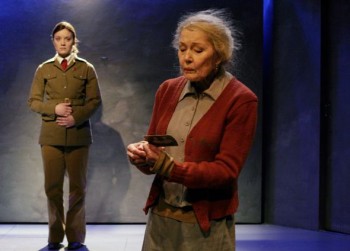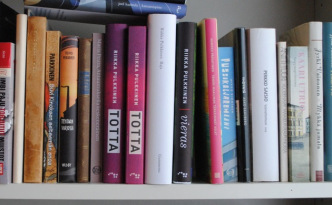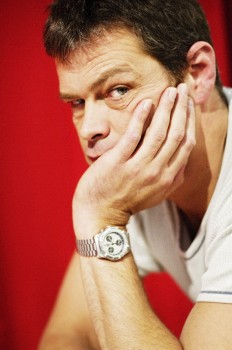Search results for "lola rogers/www.booksfromfinland.fi/2012/04/movies-and-mores/2010/02/let-us-eat-cake"
The ladies’ dining club
30 September 1994 | Archives online, Fiction, Prose
From the novel Luonnollinen ravinto (‘A natural diet’, WSOY, 1994). Interview by Tuva Korsström
My dear, wise and ever-faithful secretary, colleague, friend and right hand, you who, without counting the hours, have been my helpmeet in many awkward situations, and not only in work matters but in others, all sorts of matters that belong to my private life and particularly those, you have remembered things that I have found hard to remember, like the birthday of my wife or some important colleague, and at Christmas you have always remembered me with some small gift, always different and always carefully chosen, of which I hardly need say how much it has warmed my heart, when I haven’t been able to do better than a single miserable hyacinth. And you have always reminded me of engagements I haven’t been able to keep track of: dentists, barbers, garages, less important and more important receptions, lunches and dinners, but what is most important, and why l am most grateful to you, is that in your generosity and open-mindedness – your eternal femininity – you have understood that a person in my position may sometimes find himself in situations whose consequences he cannot always control, and that he begins to be bothered by all sorts of people, although they should understand from the smallest hint that their company is not required, and you have sensitively but firmly turned them away, sometimes telling a little lie, and you have never, ever taken a moral stand or judged my actions, but have averted your eyes, having made the decision to accept that your boss is anything but perfect. For that reason I wish to express my gratitude to you; but not, however, unreservedly. Our seamless collaboration, my ever-lovable secretary, has meant that something belonging to me has begun to belong to you, that you have become part of me just as I have become part of my wife, even before she touches me with her fork. So I have no doubt that you, too, could appear at the dinner that is soon to be arranged. Bon appetit! More…
Finlandia Prize for Fiction candidates 2012
23 November 2012 | In the news
The candidates for the Finlandia Prize for Fiction 2012 were announced on 15 November. They are Riikka Ala-Harja, Pirjo Hassinen, Heidi Köngäs, Ulla-Lena Lundberg, Aki Ollikainen and Juha Seppälä.
Their novels, respectively, are Maihinnousu (‘The landing’, Like), Popula (Otava), Dora, Dora (Otava), Is (‘Ice’, Schildts & Söderströms), Nälkävuosi (‘The year of hunger’, Siltala) and Mr. Smith (WSOY).
The jury – researcher Janna Kantola, teacher of Finnish Riitta Kulmanen and film producer Lasse Saarinen – made their choice out of ca. 130 novels. The winner, chosen by Tarja Halonen, who was President of Finland between 2000 and 2012, will be announced on 4 December. The prize, awarded since 1984, is worth 30,000 euros.
The jury’s chair, Janna Kantola, commented: ‘One of this year’s recurrent themes is the Lapland War [of 1944–1945]. Writers appear to be pondering the role of Germany in both the Second World War and in contemporary Europe. Social phenomena are examined using satire; the butt is the birth and activity of extremist political movements. Economics, the gutting of money and market forces, are present, as in previous years, but now increasingly with a sense of social responsibility.’
Popula deals with people involved in a contemporary populist political party. Dora, Dora describes Albert Speer’s journey to Finnish Lapland in 1943. Nälkävuosi depicts the year of hunger in Finland, 1868. Is takes place in the Finnish archipelago of the post-war years. Mr. Smith portrays greed and the destructive power of money both in Russian and Finnish history as well as in contemporary Finland. Maihinnousu, set in Normandy, depicts a child’s serious disease in a family that is going through divorce.
Government prize for translation 2012
14 September 2012 | In the news

Vladimír Piskoř. Photo: Charlotta Boucht
The Finnish Government Prize for the Translation of Finnish Literature of 2012 – worth €15,000 – was awarded to the Czech translator Vladimír Piskoř.
Piskoř (born 1960), graduated from the Charles University of Prague in 1984, majoring in Finnish. Since the early 1990s he has translated almost 30 titles, most by contemporary authors, including Kristina Carlson, Kari Hotakainen, Leena Krohn, Rosa Liksom, Asko Sahlberg, Juha Seppälä, Petri Tamminen and Maria Peura.
‘I personally am fond of the novels by Kari Hotakainen: I sometimes play with the idea of becoming a writer myself, and I find his style and themes particularly interesting. Kristina Carlson’s latest novel Herra Darwinin puutarhuri (‘Mr Darwin’s gardener’, 2010) is a truly inspiring work both as a reader and a translator,’ he says.
Piskoř is currently working on Kari Hotakainen’s novel Jumalan sana (‘The word of God’) and Leena Lander’s historical novel Käsky (‘Command’). In 2006 he was awarded the Czech translators’ special prize for the novel Höyhen (‘Feather’) by Asko Sahlberg.
Vladimír Piskoř received his award in Helsinki on 10 September from State Secretary Jarmo Lindén; he thanked Piskoř for the work he has done for the last twenty years, particularly in the field of contemporary Finnish fiction.
The prize has been awarded – now for the 38th time – by the Ministry of Education and Culture since 1975 on the basis of a recommendation by FILI – Finnish Literature Exchange.
Success after success
9 March 2012 | This 'n' that

The women of Purge: Elena Leeve and Tea Ista in Sofi Oksanen's Puhdistus at the Finnish National Theatre, directed by Mika Myllyaho. Photo: Leena Klemelä, 2007
Sofi Oksanen’s Purge, an unparalleled Finnish literary sensation, is running in a production by Arcola Theatre in London, from 22 February to 24 March.
First premiered at the Finnish National Theatre in Helsinki in 2007, Puhdistus, to give it its Finnish title, was subsequently reworked by Oksanen (born 1977) into a novel – her third.
Puhdistus retells the story of her play about two Estonian women, moving through the past in flashbacks between 1939 and 1992. Aliide has experienced the horrors of the Stalin era and the deportation of Estonians to Siberia, but has to cope with the guilt of opportunism and even manslaughter. One night in 1992 she finds a young woman in the courtyard of her house; Zara has just escaped from the claws of members of the Russian mafia who held her as a sex slave. (Maya Jaggi reviewed the novel in London’s Guardian newspaper.) More…
The report
30 September 1984 | Archives online, Fiction, Prose
A short story from Kesä ja keski-ikäinen nainen (‘Summer and the middle-aged woman’) Introduction by Margareta N. Deschner
Dear Colleague,
First of all, I want to thank you and your wife for the pleasant evening I and my wife had in your summer villa in August. Briitta (since we are old acquaintances: with two i’s and two t’s, remember?) especially wants me to mention that she will never forget the half moon climbing the hill behind your sauna, surprising us with its speed. The next time we looked it was half-way up the sky! Without doubt, your fine tequila had something to do with the matter, one shouldn’t forget that. Even so, it was quite a show, just like the time a bunch of us guys had gone skiing and you bragged that you had arranged for the barn to catch fire. I hope that you and your wife – I mean Alli – will be able to visit us next winter and taste a superb Mallorca red wine called Comas, which we brought home. It is by far the best red I have ever tasted and indecently cheap to boot. I hope you will come soon. The wine won’t keep indefinitely, as you well know. We’ll save it for you. So thanks again.
On the meaning of translation
28 February 2013 | This 'n' that
 Translations of Finnish literature into English are booming, according to a new website set up by the Finnish-English Literature Translation Co-operative, or FELT.
Translations of Finnish literature into English are booming, according to a new website set up by the Finnish-English Literature Translation Co-operative, or FELT.
Or at least there is a tiny boom, as translator Lola Rogers puts it in her contribution to ‘Reflections’ on the FELT website.
Whereas less than 20 translations were published between 1992 and 2002, the number of translations published in the decade from 2002 was more than 34.The reason, according to FELT, is the new availability of qualified literary translators, whom the new website has been created to represent; each of them (David Hackston, Emily Jeremiah, Kristian London, Lola Rogers, Owen Witesman) now have two or more published Finnish works of fiction under their belts.
A significant factor has been the training events organised by FILI, Finnish Literature Exchange, publisher of this magazine – and, we might dare to say, Books from Finland itself, which offers translators a forum (as well as payment) for translations of extracts from interesting or significant new work.
The FELT website is worth a visit by anyone with an interest in Finnish literature – or translation. As well as details of published and forthcoming work, there is a collection of essays on the art of translating particular works, from Kristina Carlson (also ex-Editor-in-Chief of Books from Finland) to the novelist Asko Sahlberg and the modernist poet Eeva-Liisa Manner.
Postcards from the lakeside
8 August 2010 | This 'n' that

A tower with a view: Olavinlinna (St Olaf's castle). Photo: Lola Rogers
Translator Lola Rogers (of, for example, Sofi Oksanen’s best-selling novel Purge), from Seattle, spent a few weeks in Finland, and went on a cruise on Lake Saimaa.
Olavinlinna (St Olaf’s castle), and the opera, in the city of Savonlinna, was one of her stops; take a look at her blog – you’ll perhaps recognise the the inventive 16th-century wall privies on the towers we wrote about a while ago.
There are quite a few photos from Helsinki, too – from this hot, hot (too hot?) summer.
Cruising
30 September 1993 | Archives online, Fiction, Prose
An extract from the novel Vieras (‘The stranger’, Otava 1992). Introduction by Pekka Tarkka
I lay there for a moment, motionless, eyes closed.
The bunk was damp. It felt damp around my thighs; I slid down lower – and there, it was really wet.
My sleeping bag was obviously soaked, and that meant that the mattress was soaked, too. Oh, rats. I couldn’t imagine having wet myself. Or – worse – had the boat sprung a leak, the water already rising up to the floorboards? I bounded to my feet: the rugs were dry. So was the cabin floor. I raised the boards, peered down: two fingers of water in the forward bilge, as usual. So, where the –? In the course of yesterday’s rough sailing, some water had seeped in below the windowframe. No more than a cupful, but it had trickled down inside the panel and then onto the mattress. I tried the other side of the bunk. It was dry. Well, I would just have to pick up the mattress and set it on its side. More…
Howl came upon Mr Boo
31 December 1983 | Archives online, Children's books, Drama, Fiction
The first Mr Boo book was published in 1973. Mr Boo has also made his appearance on stage this year; his theatrical companions are the children Mike and Jenny, who are not easily frightened – Mr Boo’s courage is a different matter, as can be seen in the extract from the stage play that follows overleaf.
Hannu Mäkelä describes the birth of Mr Boo:
To be honest, Mr Boo has long been my other self. The first time I drew a character who looked like him, without naming it Boo, I was really thinking of my fifteen year-old self.
The years went by and the Mr Boo drawing was forgotten for a time. It hadn’t occurred to me to write for children; I seemed to have enough to do coping with myself. Then I met Mr Boo, whom I had not yet linked up with my old drawing. My son was about six years old and we had been invited out. There were several children present. As I recall it it was a wet Sunday afternoon. I had entrenched myself with the other grown-ups in the kitchen to drink beer. The noise of the children grew worse and worse (in other words they were enjoying themselves). At last the women could bear it no longer and demanded that I, too, get to work. Really, what right had I always to be sprawled at a table with a beer glass in my hand? None. So I rose and went into the sitting-room. I shouted at the children to form a circle around me. At that time I had a motto: ‘Mäkelä – friend to children and dogs’. The reverse was true of course. The name Mr Boo occurred to me, probably as a result of some obscure private (and possibly even erotic) pun and I begun to tell a story about him. In telling it I paused dramatically and accelerated just as primary school teachers are taught to do: that part of my training, after all, wasn’t wasted. I was astonished; the children listened in complete silence. And if my memory doesn’t fail me (or even if it does, this is the way I wish to remember it), at the end of the story the smallest of the children said, rolling his r’s awkwardly, ‘Hurrrrah’. I was hooked.
The children themselves asked me to tell the same stories again. They still enjoyed them. It wasn’t long before I began to think seriously of writing a whole book about Mr Boo. For the first time in my life I really wanted to write for children. Every day after work I wrote a new Mr Boo story. Then in the evening I read it to my son. That is how the stories grew into a book.
The child likes right to triumph; he likes the good and the moral. The child is the kind of person we adults try in vain to be. It was only through Mr Boo that I began to see children in a totally new way and above all to become seriously interested in them.
The Othello of Sand Alley
31 March 1989 | Archives online, Drama, Fiction
Eeva-Liisa Manner’s Woyzeck is an independent ending to Georg Büchner’s fragmentary play. Introduction by Riitta Pohjola
PROLOGUE
(Dawn in the market square of Leipzig. A gallows looms, dimly visible in the distance. Brisk rumble of drums.)
1st WOMAN
What’s going on here?
1st MAN
They’re getting ready for an execution. Some villain’s going to be executed in public.
1st WOMAN
Who?
2nd WOMAN
Franz Woyzeck. I guess you know him, the barber. More…
Incident at Experience Farm
30 September 1998 | Archives online, Fiction, Prose
A short story from Pakkasyön odottaja (‘Waiting for a frosty night’, WSOY, 1997). Introduction by Jukka Petäjä
I
The round steel teapot is new. Father brought it back from Birmingham, where he went on a visit with the others from the concrete factory. In the shop, the teapot was wrapped in rustling, soft tissue paper. Pirjo was given the honour of opening the package. The pot has been used for brewing tea ever since.
At school, her sister Karoliina is proud of the fact that at home they drink only tea; they are different from other people, different in a good way, one to be proud of. They have a real teapot. Sometimes, during breaktime, a morsel of the excellence of Karoliina Kamppinen falls Pirjo’s way. ‘Yes, let’s include her, she’s Karoliina’s sister, after all.’ More…
Dinner with Marie
30 June 2008 | Archives online, Fiction, Prose
Extracts from the novel Marie (WSOY, 2008). Introduction by Tuomas Juntunen
For once, Marie decided to plan a dinner without the same old roast beef, boiled potatoes, peas, red wine and berry kissel. And particularly no game. The thought of rabbit reminded her of the hunting trip to Porpakka, the hounds puking up rabbit skins onto the parquet floor, the smell of singed birds, the feathers that turned up even weeks later in a corner of the kitchen, the buckshot in the goose that broke her tooth. Mind you, she had to admit that brown sauce was quite good, especially as an aspic. She had tasted a spoonful once the morning after it was made, when Martta had gone out to buy milk and Marja was cleaning the drawing room, and then Martta had come back quite suddenly, and Marie had panicked and swallowed it the wrong way and had a fit of coughing. ‘Good heavens,’ Martta had said, ‘what’s the matter? I just came back to get my purse. I forgot it on the sideboard.’
The true reason for the plan was that she wanted to show them what a real French formal dinner was like, how much better it was. She planned the menu secretly for months, first in her mind, then in writing, at her bedroom dressing table – the only place she had to herself, although the door wouldn’t lock – at first on wrapping paper, which she later burnt in the tiled stove in the dining room when no one was home. More…
Fight Club
16 April 2012 | Fiction, Prose
A short story from Himokone (‘Lust machine’, WSOY, 2012). Interview by Anna-Leena Ekroos
Karoliina wondered whether her name was suitable for a famous poet.
Her first name was alright – four syllables, and a bit old-fashioned. But Järvi didn’t inspire any passion. Should she change her name before her first collection came out? Was there still time? She had four months until September.
Even if The flower of my secret was the name of some old movie, Karoliina clung to the title she’d chosen. It described the book’s multifaceted, erotically-tinged sensory world and the essential place of nature in the poems. Karoliina loved to take long walks in the woods. Sometimes she talked to the trees.
She had been meeting new people. At the writer’s evening organised by her publisher, she’d been seated next to Märta Fagerlund, in the flesh. Karoliina had read Fagerlund’s poems since her teens, and seen her charisma light up the stage on cultural television shows.
At first Karoliina couldn’t get a word out of her mouth. She just blushed and dripped gravy on her lap. But the longer the evening went on, the more ordinary Märta seemed. She was even calling her Märta, and telling her about a new friend on Facebook who said how ‘awfully funny’ Märta was. In fact, the squeaky-voiced Märta, with her enthusiasm for Greece, was a bit dry, and, after three glasses of white wine, tedious. But Karoliina never mentioned it to anyone, because she wasn’t a spiteful person. More…

